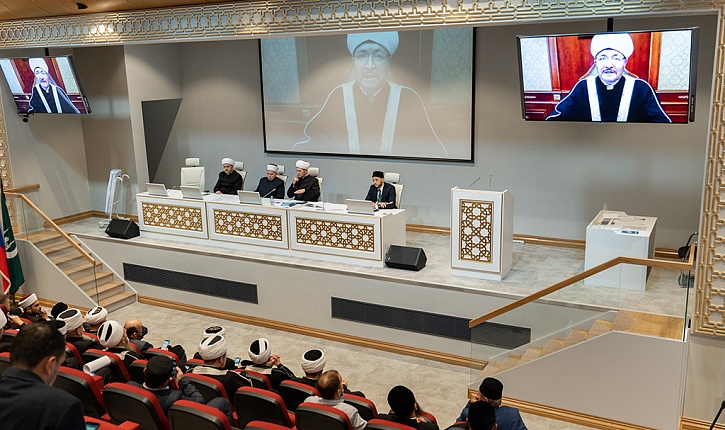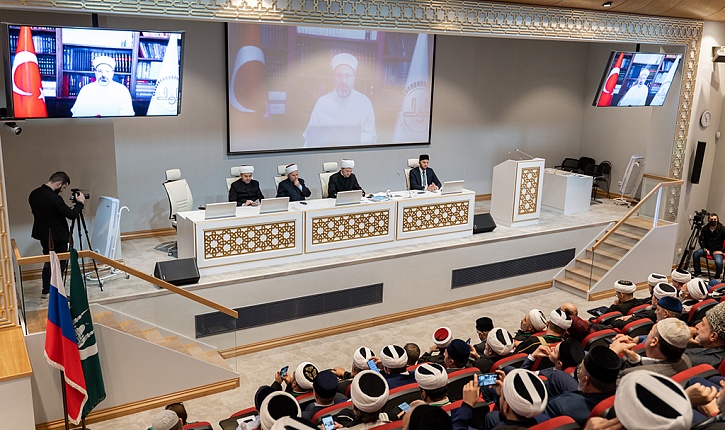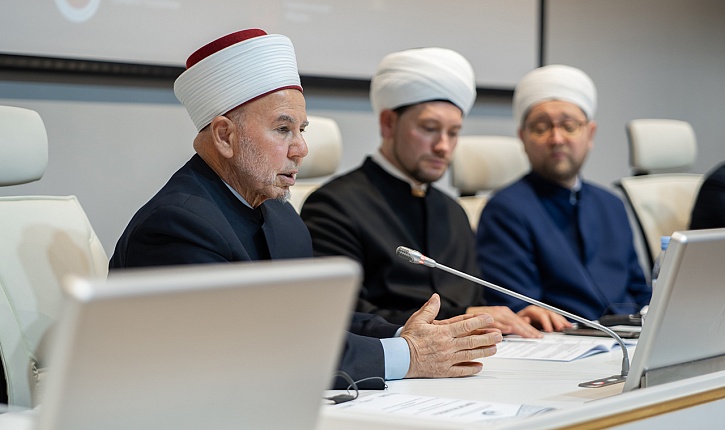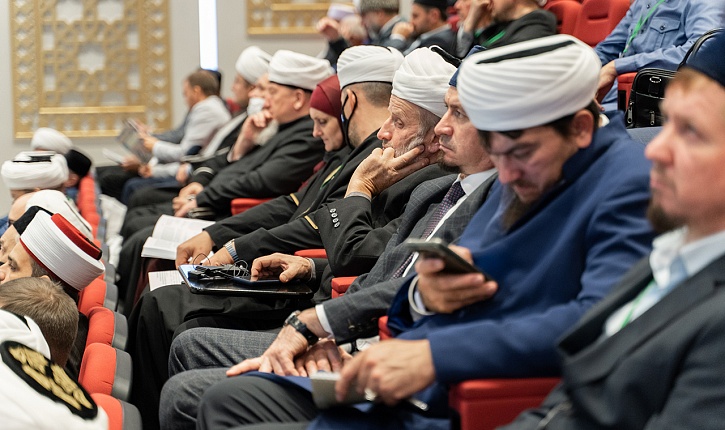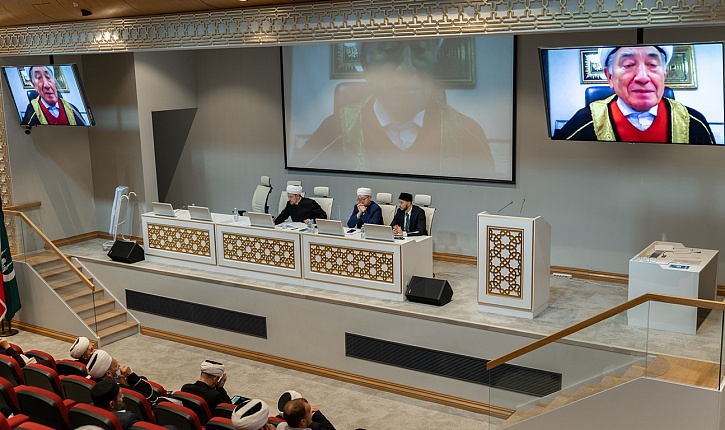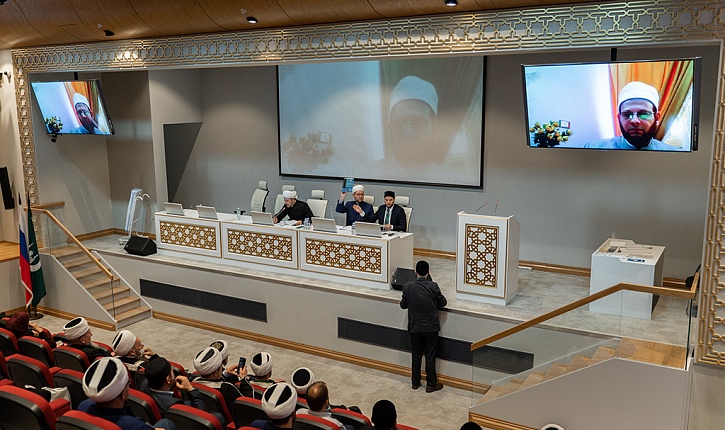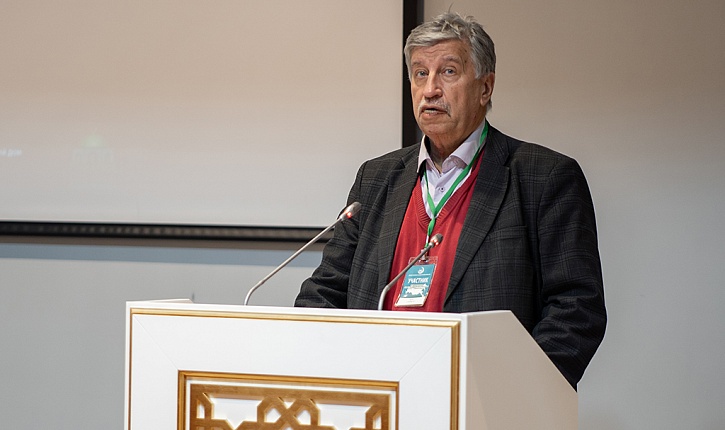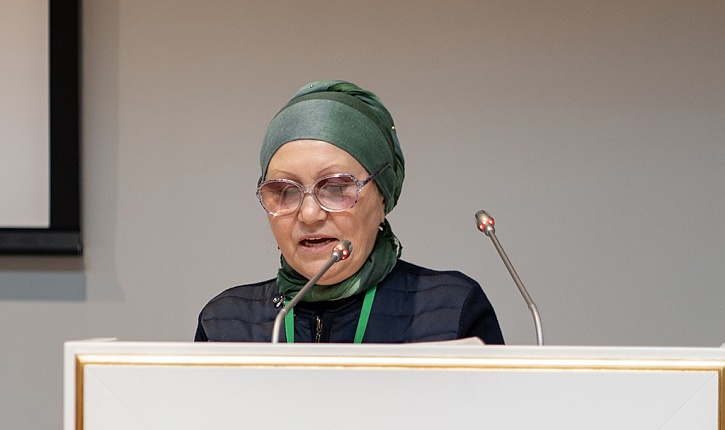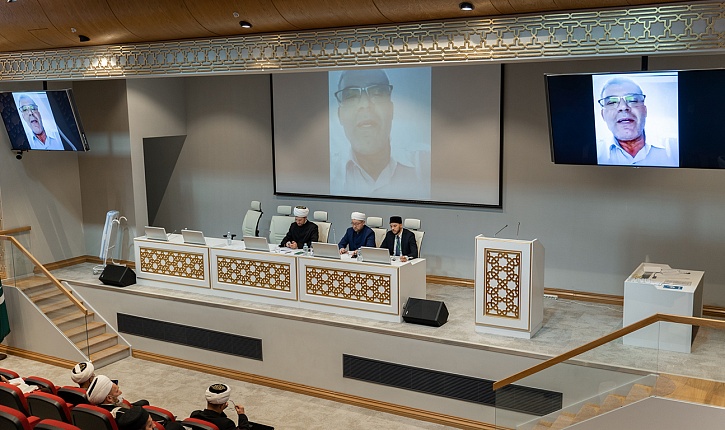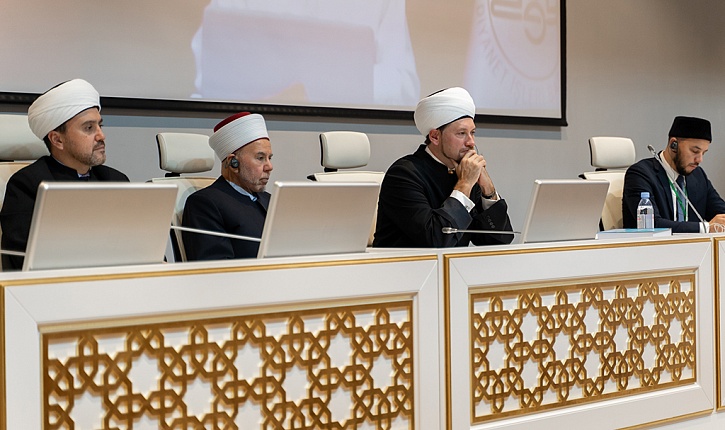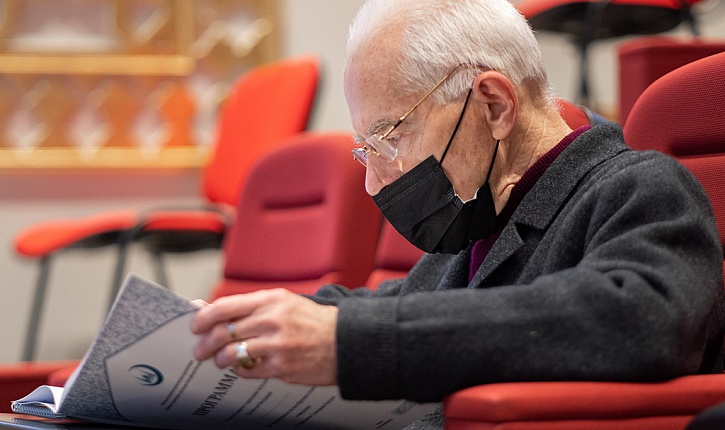Galimjan Barudi readings dedicated to the principles of intra-religious pluralism in Islamic education were held in Moscow
On 22-24 of September, the XIV International Scientific and Educational Conference "Galimjan Barudi Readings" was held in the Moscow Cathedral Mosque on the topic: "Principles of intra-religious pluralism in Islamic education". The conference was timed to coincide with the 1100th anniversary of the adoption of Islam by the peoples of Volga Bulgaria and was held with the assistance of the Foundation for the Support of Islamic Culture, Science and Education.
The annual conference dedicated to the memory of the outstanding Islamic scholar Galimjan Barudi (1857-1921) is traditionally devoted to discussing fundamental issues of the development of the Muslim Ummah. This time the conference focused on a substantive discussion of pressing issues of Islamic education and theology, special attention was paid to understanding the intellectual diversity of the Muslim Ummah in the context of educational practice, discussing a wide range of issues related to modern Muslim education and the pluralistic potential of the Islamic tradition.
The conference was held in a mixed format, attended by theologians, Islamic scholars, orientalists, political scientists, philosophers, heads of Islamic educational institutions, domestic and foreign religious figures.
The first thematic discussion within the framework of the conference focused on examples and cases of manifestations of diversity in Islam.
Thus, the speech of the adviser to the Chairman of the Russian Mufties Council, a leading researcher at the Center for the Study of Central Asia, the Caucasus and the Ural-Volga Region of the Institute of Oriental Studies of the Russian Academy of Sciences (Moscow), Candidate of Philological Sciences Farid Asadullin was devoted to the topic "The dichotomy of Sunnism/Shiism in the theological heritage of Abunasr Kursavi and Shigabutdin Marjani". Working with the writings of Tatar theologians, including the work of A. Kursavi "Instruction on the path of truth" ("Al-Irshad lil-l-ibad") and the treatise of Sh. Marjani "Mature Wisdom" ("Al-Hikma al-baliga"), the researcher came to the conclusion that in these works both Muslim philosophers sought to form a critical view of the nature of intra-Islamic religious differences, formulate a compromise model of their possible conflict-free existence, as well as combine scientific (historical) knowledge with personal deep faith. Both Kursavi and Marjani, as F. notes. Asadullin, considered Shiism and Sunnism "as two versions of doctrinal Islam, which came to the Islamic Jamaat through the Prophet Muhammad."
For his part, Leonid Syukiyainen, Doctor of Law, Professor of the Department of Theory and History of Law at the National Research University Higher School of Economics (Moscow), considered the topic of pluralism in Islam on the example of religious law ("The Principle of pluralism in modern Fiqh"). According to the professor, for a scientific understanding of the features and current trends in the development of the Islamic legal system, it is necessary to take into account the fact that "diversity, diversity of views, different positions are the characteristic feature of Islam," which is manifested, among other things, in the understanding of Sharia, expressed at the Fiqh level. Historically, many different interpretations have existed and continue to exist in Fiqh, which in itself confirms the principle of pluralism. This feature clearly manifests itself in modern conditions, when in some countries of the Islamic world and in works on Fiqh there is a tendency to move away from rigid connectedness with a certain sense. "Modern Fiqh in the Muslim world is developing both as a science and as the current rules and regulations at the level of the academy, at the level of legislation towards a vague, gradual, soft, thoughtful, balanced, but still moving away from rigid connectedness with a certain sense towards the possibility of searching for different solutions," L. Sukiyainen concluded.
The topic of pluralism of positions in religious law on the example of the Dagestan Shafi'i school of the XVIII-XX centuries was also voiced in the speech of Candidate of Historical Sciences, senior researcher at the Institute of Oriental Studies of the Russian Academy of Sciences, Head of the Center for the Study of Central Asia, the Caucasus and the Ural-Volga Region (Moscow) Vladimir Bobrovnikov ("Pluralism or hybridity of Sharia justice in the Eastern Caucasus: rereading the classics of the Dagestan Shafi'i school of the XVIII-XX centuries"). In particular, the report pointed to cases of ambiguous interpretation of the question of the relationship between sharia and local custom (adat).
The second thematic area of the conference was devoted to Islamic education, discussing its place and role then and today.
Thus, Dmitry Mikulsky, Doctor of Historical Sciences, Head of the Historical Source Studies Sector of the Institute of Oriental Studies of the Russian Academy of Sciences, member of the Academic Council of the Institute of Oriental Studies of the Russian Academy of Sciences (Moscow), made a report on the study of the functioning of the Muslim education system in the Arab world, based on essays compiled by the Russian orientalist V.F. Girgas (1835-1887) on Muslim education in Arab countries (based on his own field observations). According to the scientist, V. F. Girgas observed in Arab countries a traditional system of education and teaching, in which the main emphasis is placed on teaching theological and legal disciplines. In modern conditions, although Muslim education has undergone various changes in the field of expanding the range of disciplines taught and pedagogical techniques, nevertheless, according to D. Mikulsky, many of the basics of teaching, including the assimilation of a large amount of (religious) material and memorizing the Koran and Hadith, still remain unchanged.
For his part, Faris Nofal, a researcher in the Philosophy Sector of the Islamic World of the Institute of Philosophy of the Russian Academy of Sciences, Master of Philosophy, (Moscow), devoted his report to the topic: "Pluralism in modern theological education: towards the formulation of the problem." In particular, in his speech, he drew attention to the current problems taking place in the development of theological knowledge. According to him, theological education today "insufficiently expresses the principle of pluralism and polyphony (polyphony"). Also, according to F. According to Novak, today there is a rather acute need for high-quality educational literature and manuals on the history of Muslim theology that would fully take into account its internal specifics. "We still need coverage of all currents of Muslim thought," F. Nofal said. Speaking about the place and role of the theologian today, he said that "the theologian is still an expert in working with the present time and authentic material, he operates in the language of tradition, unconquered by superficial critics, his task is to describe religion effectively and extremely accurately and analyze the patterns of its historical development, and this task is not determined by confessional attitudes."
Marina Mchedlova, Head of the Department of Comparative Political Science of the Russian Academy of Sciences, Chief Researcher of the Center "Religion in Modern Society" of the Federal Research Sociological Center of the Russian Academy of Sciences (Moscow), Doctor of Political Sciences, Professor, devoted her report to the topic "Pluralism in religious education and pluralism of education: sources, subjects, goals". In her speech, she highlighted three important spheres of application of religious education in Russia: organization of work with young people, discussions about the new status of theology, access to the space of dialogue (with secular education, with state structures, with followers of other religious traditions). According to the professor, the subjects of religious education are religious organizations, individuals, the family, the state, and its importance for modern society is that it carries out work on building value systems, also carries an educational function, the function of socialization of the individual. "Of course, education and knowledge are probably what makes a person human," concluded M. Mchedlova.
Gulfiya Habibullina, Director of the Center for the Development of Islamic Education at the Moscow Islamic Institute, Candidate of Pedagogical Sciences, also spoke about the high responsibility assigned to Islamic educational organizations in building a system of values among students. According to the speaker, the main sources of Islamic education that form the worldview, way of thinking and actions/behaviors of a believer are the Quran and the Sunnah of the Prophet Muhammad. Comprehension of the meanings inherent in these sacred texts, their disclosure and understanding in relation to nowadays are the issues that are constantly raised in the framework of the educational process. In addition, no less important in the field of religious education is the educational and methodological support, the publication of original works and their translations, which allows students to get acquainted with the pluralism of opinions in the Islamic tradition in the learning process.
Also, the Imam-muhtasib of the Ryazan region, Chairman of the RBM of the Ryazan region, postgraduate student of the Ryazan State University named after S.A. Yesenin (Ryazan) made reports on the issues of pluralism in Islamic theology and the concept of Islamic education in the light of the diversity of the Ummah Rashid Bultacheyev ("Fatwa-making Institutes of Modern Russia in solving issues of intercultural interaction"); Candidate of Philological Sciences, Deputy Head of the Department of Arabic Philology at the Institute of Asian and African Countries of Lomonosov Moscow State University (Moscow Moscow), Vladimir Lebedev ("Specific features of the Arabic language system: the Arabic linguistic tradition and the teaching of the Arabic language"); Vice-rector for Academic Affairs of the Moscow Islamic Institute (Moscow) Rais Izmailov ("Magistracy at the Moscow Islamic Institute: features of the program, its goals and objectives"); director of the religious organization of Muslims - the spiritual professional educational organization of the Islamic Madrasah "mAkhinur", Deputy Chairman of the University of Dzerzhinsk (Moscow Dzerzhinsk) Rafek Timerbayev ("The influence of information technologies on teaching methods at the mAkhinur madrasah"); Chairman of the local religious organization of Muslims "Enlightenment" (Yekaterinburg) Ruslan Nurmametov ("Primary education (mektebe) on the basis of a local religious organization of Muslims: the current situation, problems and prospects of development"); Professor of the Department of Cultural Studies and Religious Studies of the Faculty of Philosophy and Political Science of the Al-Farabi Kazakh National University, Dr. Philos. sciences (G. Almaty, Republic of Kazakhstan) Kalima Begalinova ("Islamic Education in the Republic of Kazakhstan: state and prospects of development").
After the panel sessions, a plenary session of the conference was held, which was attended by distinguished guests – foreign Muslim religious figures and scientists.
The plenary part of the conference was opened by a speech by the Chairman of the Religious Board of Muslims of the Russian Federation, General Secretary of the Muslim International Forum Mufti Sheikh Ravil Gaynutdin. In his welcoming speech to the organizers and participants of the conference, the head of the Muslims of Russia noted: "The study of the Islamic intellectual heritage in all its completeness and complexity, the integration into a single intellectual process of theological thought of the past, present and future requires us to be open to the very process of cognition and thinking. The intra-religious pluralism included in the name of the conference is understood by us as a reason and a basis for dialogue and consolidation, a constant scientific search." After familiarizing the participants of the event with the current work of the Religious Board of Muslims of the Russian Federation through international academic cooperation (Egypt, Turkey, Iran, Germany, etc.), Mufti Gaynutdin stressed that "the focus of our attention is constantly on the study of the richest Islamic heritage in order to popularize it for the general public." Confirmation of the implementation of this activity was the presentation of 12 new publications issued under the auspices of the Duma of the Russian Federation, held on the first day of the conference (September 22, 2021). At the end of his welcoming speech, the spiritual leader of Russian Muslims called on all participants of the high assembly to take an active part in the upcoming events on the occasion of the 1100th anniversary of the adoption of Islam by the peoples of Volga Bulgaria, the World Conference on Intercultural and Interreligious Dialogue (May 16-18, 2022, St. Petersburg), the 200th anniversary of the birth of Husain Faizkhanov and the 150th anniversary of the birth of Musa Bigiev.
The speeches of the distinguished guests - foreign Muslim religious figures and scientists were devoted to discussing the idea of pluralism in Islam, current problems of Islamic education and knowledge, especially role in countering extremism and terrorism.
Thus, the head of the Department of Religious Affairs of the Republic of Turkey, Dr. Ali Erbash, spoke online. In particular, in the field of the existence of pluralism in Islam, he noted that "... various ideas, interpretations and practices in Islamic thought are a means of mercy," while he also pointed out that "various ideas should be approached critically," as befits a Muslim, that is, observing a moderate approach and showing tolerance for such disagreements, but only if they do not contradict the universal tenets of Islam.
The speech of the Mufti of the Hashemite Kingdom of Jordan (Amman, Jordan), Doctor of Sharia Sciences, Professor, Sheikh Abdul-Karim Hasavneh was also devoted to the problem of moderation in Islam, in particular, the need to follow this path in case of theological decisions or conclusions (fatwas) on issues relevant to the entire Muslim Ummah, issues on the public agenda: education of high morality, moral values, countering terrorism, etc. "We must follow the path of science, the path of knowledge, in order to bring people confidence, calmness and guarantees," the mufti said.
Vice-Rector for International Affairs of the University of Religions and Confessions of Iran. (Tehran, Islamic Republic of Iran) Khujat al-Islam wa-l-Muslimin Dr. Mahdi Tashiri, who took part in the conference online, stressed that the problem of religious education and education of students from the position of Islam is a multifaceted topic in itself. "For Muslims, one of the important purpose of the prophecy of Muhammad (peace be upon him) is the multiplication of knowledge.
The role of scientists in building a civilization and its development is great. It's no secret that knowledge is the light that leads to creation and scientific discoveries. With the arrival of knowledge, ignorance and irrationalism go away. Without knowledge, humanity would not be able to ensure its superiority over other creations," the speaker stressed.
For his part, Dr. Ahmad al-Savi, a lecturer in Akida and philosophy at the Faculty of Arabic and Islamic Studies at Al-Azhar University (Egypt), said that the diversity of people is predetermined by God. "The Qur'an says that difference is a human and social law, and that diversity among people will exist until the end of the world, and that Allah willed it as such," said Professor Al–Azhara. The presence of this diversity also predetermines a difference of opinion, but a difference of this kind, according to Dr. as-Savi, should not be "a source of disagreement and conflict, but on the contrary a source of integration and abundance." Using the example of the educational activities of Al-Azhar University, the professor also stressed that "education in Al-Azhar is characterized by respect for the principle of pluralism, respect for the opinions of others," this approach in teaching is applied to the teaching of Fiqh discipline.
Chairman of the Republican Religious Association "Muslim Religious Association in the Republic of Belarus" (Minsk, Republic of Belarus) Mufti Abu-Bekir Shabanovich in his speech noted the increase in the Islamic factor in the Republic of Belarus over the past ten years, which has become "the most important part in the life of the Republic, in its history, in strengthening the civil community." Our way today is "not to incite, but on the contrary – to unite not only opinions, but also views in order to develop peace and tranquility in society through our actions," the mufti of Belarus said.
The final report of the plenary session of the conference was a speech by Dr. Khaled Trudi, Director of the Kairouan Center for Islamic Studies at Zaytoun University, Head of the Laboratory of Islamic Thought and its Transformation and Nation-State Building (Tunis, Tunisian Republic), which was devoted to the topic "Islam's call to religious pluralism through the Medina Constitution: Reading authentic texts".
The organizers of the XIV International Scientific and Educational Conference "Galimjan Barudi Readings" on the topic: "Principles of intra-religious Pluralism in Islamic Education" were presented by: the Spiritual Administration of Muslims of the Russian Federation, the Moscow Islamic Institute and the Center for Islamic Studies of St. Petersburg State University with the assistance of the Foundation for the Support of Islamic Culture, Science and Education.
The conference was held as part of the implementation in 2021 of the Action Plan for the Development of Islamic Education and training of specialists with in-depth knowledge of the history and culture of Islam.
The annual conference dedicated to the memory of the outstanding Islamic scholar Galimjan Barudi (1857-1921) is traditionally devoted to discussing fundamental issues of the development of the Muslim Ummah. This time the conference focused on a substantive discussion of pressing issues of Islamic education and theology, special attention was paid to understanding the intellectual diversity of the Muslim Ummah in the context of educational practice, discussing a wide range of issues related to modern Muslim education and the pluralistic potential of the Islamic tradition.
The conference was held in a mixed format, attended by theologians, Islamic scholars, orientalists, political scientists, philosophers, heads of Islamic educational institutions, domestic and foreign religious figures.
The first thematic discussion within the framework of the conference focused on examples and cases of manifestations of diversity in Islam.
Thus, the speech of the adviser to the Chairman of the Russian Mufties Council, a leading researcher at the Center for the Study of Central Asia, the Caucasus and the Ural-Volga Region of the Institute of Oriental Studies of the Russian Academy of Sciences (Moscow), Candidate of Philological Sciences Farid Asadullin was devoted to the topic "The dichotomy of Sunnism/Shiism in the theological heritage of Abunasr Kursavi and Shigabutdin Marjani". Working with the writings of Tatar theologians, including the work of A. Kursavi "Instruction on the path of truth" ("Al-Irshad lil-l-ibad") and the treatise of Sh. Marjani "Mature Wisdom" ("Al-Hikma al-baliga"), the researcher came to the conclusion that in these works both Muslim philosophers sought to form a critical view of the nature of intra-Islamic religious differences, formulate a compromise model of their possible conflict-free existence, as well as combine scientific (historical) knowledge with personal deep faith. Both Kursavi and Marjani, as F. notes. Asadullin, considered Shiism and Sunnism "as two versions of doctrinal Islam, which came to the Islamic Jamaat through the Prophet Muhammad."
For his part, Leonid Syukiyainen, Doctor of Law, Professor of the Department of Theory and History of Law at the National Research University Higher School of Economics (Moscow), considered the topic of pluralism in Islam on the example of religious law ("The Principle of pluralism in modern Fiqh"). According to the professor, for a scientific understanding of the features and current trends in the development of the Islamic legal system, it is necessary to take into account the fact that "diversity, diversity of views, different positions are the characteristic feature of Islam," which is manifested, among other things, in the understanding of Sharia, expressed at the Fiqh level. Historically, many different interpretations have existed and continue to exist in Fiqh, which in itself confirms the principle of pluralism. This feature clearly manifests itself in modern conditions, when in some countries of the Islamic world and in works on Fiqh there is a tendency to move away from rigid connectedness with a certain sense. "Modern Fiqh in the Muslim world is developing both as a science and as the current rules and regulations at the level of the academy, at the level of legislation towards a vague, gradual, soft, thoughtful, balanced, but still moving away from rigid connectedness with a certain sense towards the possibility of searching for different solutions," L. Sukiyainen concluded.
The topic of pluralism of positions in religious law on the example of the Dagestan Shafi'i school of the XVIII-XX centuries was also voiced in the speech of Candidate of Historical Sciences, senior researcher at the Institute of Oriental Studies of the Russian Academy of Sciences, Head of the Center for the Study of Central Asia, the Caucasus and the Ural-Volga Region (Moscow) Vladimir Bobrovnikov ("Pluralism or hybridity of Sharia justice in the Eastern Caucasus: rereading the classics of the Dagestan Shafi'i school of the XVIII-XX centuries"). In particular, the report pointed to cases of ambiguous interpretation of the question of the relationship between sharia and local custom (adat).
The second thematic area of the conference was devoted to Islamic education, discussing its place and role then and today.
Thus, Dmitry Mikulsky, Doctor of Historical Sciences, Head of the Historical Source Studies Sector of the Institute of Oriental Studies of the Russian Academy of Sciences, member of the Academic Council of the Institute of Oriental Studies of the Russian Academy of Sciences (Moscow), made a report on the study of the functioning of the Muslim education system in the Arab world, based on essays compiled by the Russian orientalist V.F. Girgas (1835-1887) on Muslim education in Arab countries (based on his own field observations). According to the scientist, V. F. Girgas observed in Arab countries a traditional system of education and teaching, in which the main emphasis is placed on teaching theological and legal disciplines. In modern conditions, although Muslim education has undergone various changes in the field of expanding the range of disciplines taught and pedagogical techniques, nevertheless, according to D. Mikulsky, many of the basics of teaching, including the assimilation of a large amount of (religious) material and memorizing the Koran and Hadith, still remain unchanged.
For his part, Faris Nofal, a researcher in the Philosophy Sector of the Islamic World of the Institute of Philosophy of the Russian Academy of Sciences, Master of Philosophy, (Moscow), devoted his report to the topic: "Pluralism in modern theological education: towards the formulation of the problem." In particular, in his speech, he drew attention to the current problems taking place in the development of theological knowledge. According to him, theological education today "insufficiently expresses the principle of pluralism and polyphony (polyphony"). Also, according to F. According to Novak, today there is a rather acute need for high-quality educational literature and manuals on the history of Muslim theology that would fully take into account its internal specifics. "We still need coverage of all currents of Muslim thought," F. Nofal said. Speaking about the place and role of the theologian today, he said that "the theologian is still an expert in working with the present time and authentic material, he operates in the language of tradition, unconquered by superficial critics, his task is to describe religion effectively and extremely accurately and analyze the patterns of its historical development, and this task is not determined by confessional attitudes."
Marina Mchedlova, Head of the Department of Comparative Political Science of the Russian Academy of Sciences, Chief Researcher of the Center "Religion in Modern Society" of the Federal Research Sociological Center of the Russian Academy of Sciences (Moscow), Doctor of Political Sciences, Professor, devoted her report to the topic "Pluralism in religious education and pluralism of education: sources, subjects, goals". In her speech, she highlighted three important spheres of application of religious education in Russia: organization of work with young people, discussions about the new status of theology, access to the space of dialogue (with secular education, with state structures, with followers of other religious traditions). According to the professor, the subjects of religious education are religious organizations, individuals, the family, the state, and its importance for modern society is that it carries out work on building value systems, also carries an educational function, the function of socialization of the individual. "Of course, education and knowledge are probably what makes a person human," concluded M. Mchedlova.
Gulfiya Habibullina, Director of the Center for the Development of Islamic Education at the Moscow Islamic Institute, Candidate of Pedagogical Sciences, also spoke about the high responsibility assigned to Islamic educational organizations in building a system of values among students. According to the speaker, the main sources of Islamic education that form the worldview, way of thinking and actions/behaviors of a believer are the Quran and the Sunnah of the Prophet Muhammad. Comprehension of the meanings inherent in these sacred texts, their disclosure and understanding in relation to nowadays are the issues that are constantly raised in the framework of the educational process. In addition, no less important in the field of religious education is the educational and methodological support, the publication of original works and their translations, which allows students to get acquainted with the pluralism of opinions in the Islamic tradition in the learning process.
Also, the Imam-muhtasib of the Ryazan region, Chairman of the RBM of the Ryazan region, postgraduate student of the Ryazan State University named after S.A. Yesenin (Ryazan) made reports on the issues of pluralism in Islamic theology and the concept of Islamic education in the light of the diversity of the Ummah Rashid Bultacheyev ("Fatwa-making Institutes of Modern Russia in solving issues of intercultural interaction"); Candidate of Philological Sciences, Deputy Head of the Department of Arabic Philology at the Institute of Asian and African Countries of Lomonosov Moscow State University (Moscow Moscow), Vladimir Lebedev ("Specific features of the Arabic language system: the Arabic linguistic tradition and the teaching of the Arabic language"); Vice-rector for Academic Affairs of the Moscow Islamic Institute (Moscow) Rais Izmailov ("Magistracy at the Moscow Islamic Institute: features of the program, its goals and objectives"); director of the religious organization of Muslims - the spiritual professional educational organization of the Islamic Madrasah "mAkhinur", Deputy Chairman of the University of Dzerzhinsk (Moscow Dzerzhinsk) Rafek Timerbayev ("The influence of information technologies on teaching methods at the mAkhinur madrasah"); Chairman of the local religious organization of Muslims "Enlightenment" (Yekaterinburg) Ruslan Nurmametov ("Primary education (mektebe) on the basis of a local religious organization of Muslims: the current situation, problems and prospects of development"); Professor of the Department of Cultural Studies and Religious Studies of the Faculty of Philosophy and Political Science of the Al-Farabi Kazakh National University, Dr. Philos. sciences (G. Almaty, Republic of Kazakhstan) Kalima Begalinova ("Islamic Education in the Republic of Kazakhstan: state and prospects of development").
After the panel sessions, a plenary session of the conference was held, which was attended by distinguished guests – foreign Muslim religious figures and scientists.
The plenary part of the conference was opened by a speech by the Chairman of the Religious Board of Muslims of the Russian Federation, General Secretary of the Muslim International Forum Mufti Sheikh Ravil Gaynutdin. In his welcoming speech to the organizers and participants of the conference, the head of the Muslims of Russia noted: "The study of the Islamic intellectual heritage in all its completeness and complexity, the integration into a single intellectual process of theological thought of the past, present and future requires us to be open to the very process of cognition and thinking. The intra-religious pluralism included in the name of the conference is understood by us as a reason and a basis for dialogue and consolidation, a constant scientific search." After familiarizing the participants of the event with the current work of the Religious Board of Muslims of the Russian Federation through international academic cooperation (Egypt, Turkey, Iran, Germany, etc.), Mufti Gaynutdin stressed that "the focus of our attention is constantly on the study of the richest Islamic heritage in order to popularize it for the general public." Confirmation of the implementation of this activity was the presentation of 12 new publications issued under the auspices of the Duma of the Russian Federation, held on the first day of the conference (September 22, 2021). At the end of his welcoming speech, the spiritual leader of Russian Muslims called on all participants of the high assembly to take an active part in the upcoming events on the occasion of the 1100th anniversary of the adoption of Islam by the peoples of Volga Bulgaria, the World Conference on Intercultural and Interreligious Dialogue (May 16-18, 2022, St. Petersburg), the 200th anniversary of the birth of Husain Faizkhanov and the 150th anniversary of the birth of Musa Bigiev.
The speeches of the distinguished guests - foreign Muslim religious figures and scientists were devoted to discussing the idea of pluralism in Islam, current problems of Islamic education and knowledge, especially role in countering extremism and terrorism.
Thus, the head of the Department of Religious Affairs of the Republic of Turkey, Dr. Ali Erbash, spoke online. In particular, in the field of the existence of pluralism in Islam, he noted that "... various ideas, interpretations and practices in Islamic thought are a means of mercy," while he also pointed out that "various ideas should be approached critically," as befits a Muslim, that is, observing a moderate approach and showing tolerance for such disagreements, but only if they do not contradict the universal tenets of Islam.
The speech of the Mufti of the Hashemite Kingdom of Jordan (Amman, Jordan), Doctor of Sharia Sciences, Professor, Sheikh Abdul-Karim Hasavneh was also devoted to the problem of moderation in Islam, in particular, the need to follow this path in case of theological decisions or conclusions (fatwas) on issues relevant to the entire Muslim Ummah, issues on the public agenda: education of high morality, moral values, countering terrorism, etc. "We must follow the path of science, the path of knowledge, in order to bring people confidence, calmness and guarantees," the mufti said.
Vice-Rector for International Affairs of the University of Religions and Confessions of Iran. (Tehran, Islamic Republic of Iran) Khujat al-Islam wa-l-Muslimin Dr. Mahdi Tashiri, who took part in the conference online, stressed that the problem of religious education and education of students from the position of Islam is a multifaceted topic in itself. "For Muslims, one of the important purpose of the prophecy of Muhammad (peace be upon him) is the multiplication of knowledge.
The role of scientists in building a civilization and its development is great. It's no secret that knowledge is the light that leads to creation and scientific discoveries. With the arrival of knowledge, ignorance and irrationalism go away. Without knowledge, humanity would not be able to ensure its superiority over other creations," the speaker stressed.
For his part, Dr. Ahmad al-Savi, a lecturer in Akida and philosophy at the Faculty of Arabic and Islamic Studies at Al-Azhar University (Egypt), said that the diversity of people is predetermined by God. "The Qur'an says that difference is a human and social law, and that diversity among people will exist until the end of the world, and that Allah willed it as such," said Professor Al–Azhara. The presence of this diversity also predetermines a difference of opinion, but a difference of this kind, according to Dr. as-Savi, should not be "a source of disagreement and conflict, but on the contrary a source of integration and abundance." Using the example of the educational activities of Al-Azhar University, the professor also stressed that "education in Al-Azhar is characterized by respect for the principle of pluralism, respect for the opinions of others," this approach in teaching is applied to the teaching of Fiqh discipline.
Chairman of the Republican Religious Association "Muslim Religious Association in the Republic of Belarus" (Minsk, Republic of Belarus) Mufti Abu-Bekir Shabanovich in his speech noted the increase in the Islamic factor in the Republic of Belarus over the past ten years, which has become "the most important part in the life of the Republic, in its history, in strengthening the civil community." Our way today is "not to incite, but on the contrary – to unite not only opinions, but also views in order to develop peace and tranquility in society through our actions," the mufti of Belarus said.
The final report of the plenary session of the conference was a speech by Dr. Khaled Trudi, Director of the Kairouan Center for Islamic Studies at Zaytoun University, Head of the Laboratory of Islamic Thought and its Transformation and Nation-State Building (Tunis, Tunisian Republic), which was devoted to the topic "Islam's call to religious pluralism through the Medina Constitution: Reading authentic texts".
The organizers of the XIV International Scientific and Educational Conference "Galimjan Barudi Readings" on the topic: "Principles of intra-religious Pluralism in Islamic Education" were presented by: the Spiritual Administration of Muslims of the Russian Federation, the Moscow Islamic Institute and the Center for Islamic Studies of St. Petersburg State University with the assistance of the Foundation for the Support of Islamic Culture, Science and Education.
The conference was held as part of the implementation in 2021 of the Action Plan for the Development of Islamic Education and training of specialists with in-depth knowledge of the history and culture of Islam.
